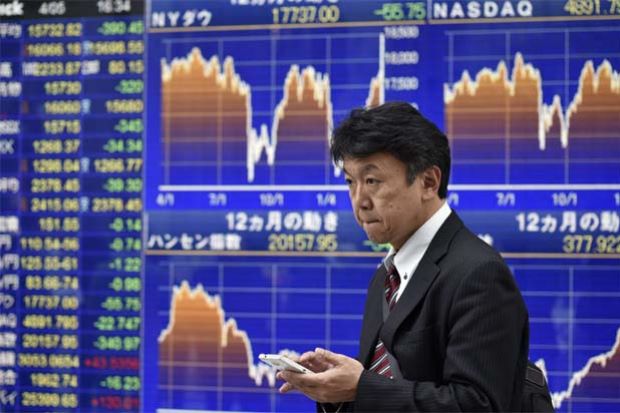Tokyo: Asian shares edged up on Friday as investors kept a wary eye on another U.S. storm, while the dollar skidded after European Central Bank chief Mario Draghi suggested the bank may begin tapering its massive stimulus program this autumn.
MSCI’s broadest index of Asia-Pacific shares outside Japan added 0.1 percent, but was still down 0.2 percent for the week.
Japan’s Nikkei stock index was pressured by a stronger yen and slipped 0.5 percent, losing 2 percent for the week.
Wall Street ended little changed on Thursday, as investors continued to tracking Hurricane Irma, which was bearing down on Florida on the heels of devastation in Texas caused by Hurricane Harvey.
Economists said Harvey could weigh on U.S. economic growth for the third quarter, though they did not this to delay the U.S. Federal Reserve’s announcement of a plan at its meeting this month to start trimming its $4.2 trillion debt portfolio.
The storm caused U.S. initial jobless claims to spike to a two-year high, despite an underlying strength in the labor market.
New York Fed President William Dudley said on Thursday that the central bank should continue gradually raising U.S. interest rates given low inflation should rebound, sounding slightly less confident than his previous hawkish comments in the face of weak price readings.
The benchmark U.S. Treasury yield stood at 2.045 percent US10YT=RR in Asian trade, down from its U.S. close of 2.061 percent. It plumbed a 10-month low of 2.03 percent on Thursday.
Besides the slumping Treasury yields, the dollar was also pressured by ECB head Draghi’s remarks that policymakers would decide on tapering this autumn, and that “probably the bulk of these decisions will be taken in October.”
The ECB must consider the weakening of inflation owing to the strong euro as it prepares to wind down its stimulus, Draghi said, after the central bank kept rates at record lows at its regular policy meeting and confirmed that asset purchases would continue at least until December.
The euro was up 0.1 percent at $1.2028 after surging as high as $1.2059 on Thursday, not far from its 2-1/2-year high of $1.2070 hit late last month.
The dollar inched 0.1 percent lower against the yen to 108.32 yen, moving back toward a 10-month low of 108.05 touched on Thursday.
The dollar index, which tracks the greenback against a basket of six major currencies, was down 0.2 percent at 91.467, moving back toward Thursday’s low of 91.405, its weakest since January 2015.
Crude oil futures firmed, with Brent crude gaining 7 cents, or 0.1 percent, to $54.56 a barrel, while U.S. crude edged up 2 cents to $49.11 per barrel.
On Thursday, global crude oil benchmarks diverged, with Brent rising to a 5-1/2 month high. But U.S. crude slipped on a bigger-than expected crude stock build, as the restart of U.S. refiners after Hurricane Harvey was countered by the threat of Hurricane Irma.




